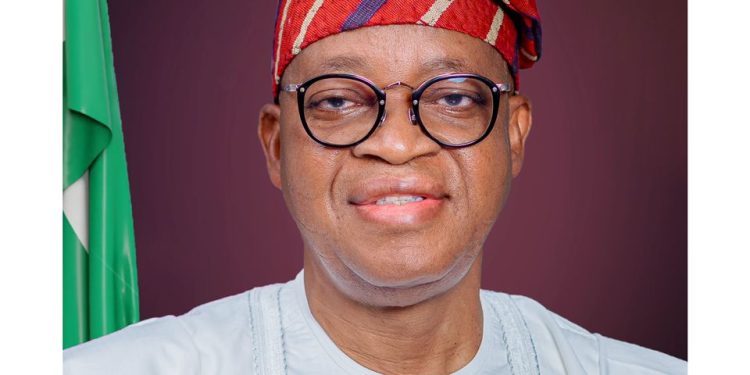By Chris Agabi
The Minister of Marine and Blue Economy, H.E. Adegboyega Oyetola has lauded the proposed establishment of the National Coast Guard Bill.
He said when passed, it will be the catalyst needed in unlocking the nation’s maritime potential.
The minister made this known at the National Assembly complex at the 1-Day Public Hearing on National Coast Guard Bill (NCG) a statement by Muhammad Tahir Zakari, the Head, Press, and PR.
FMM&BE said.
He highlighted that the bill when passed, will guarantee maritime safety, sustainable marine resource development and enhance economic growth.
Outlining the major domian around establishment and need for the National Coast Guard, the Minister identified;
1.Maritime safety
2. Environmental protection through enforcing environmental regulations and conservation of marine ecosystems,
3. Enforcement of civil maritime laws to uphold laws governing civil maritime activities and enforce fishing regulations while preventing illegal exploitation
4. Search and rescue to maritime emergencies and also conduct timely search and rescue operations.
He cited a 2009 publication by the African Centre for Strategic Studies, which noted that 15 of the 21 independent maritime nations in sub-Saharan Africa have dedicated coast guards and identify themselves as such. Despite this, none of these nations have Nigeria’s population or the extent of its inland waterways and coastline.
While acknowledging the significant role of the Nigerian Navy in safeguarding the Nigerian maritime space following the collaborative effort with the Ministry of Marine and Blue Economy in the Deep Blue Project which has shown great results with zero piracy in Nigeria’s territorial water in the last three years.
He, however, stressed the need for the National Coast Guard to complement the efforts of the Nigerian Navy in playing a critical role in preventing accidents, crime, and other threats to maritime activities
“A vast coastline of 850 km, the equivalent of 10,000 km in two ways. It is also a place of rich and diverse economic sources.”
While these opportunities are promising, they also present challenges such as pollution, overfishing, and unsustainable use of marine resources. The proposed National Coast Guard is equipped to tackle these issues.
He urged the Senate and the National Assembly to lend their full support to the bill, pointing that, “Nigeria Coast Guard will act as a vital complement to the Navy, of fostering a safe and sustainable maritime environment.”
He further appealed for the establishment of a flexible, adaptive implementation strategy that would evolve into a midwife for the bill to succeed while urging those with reservations to see the pressing need of the institution.
Earlier during the hearing, the President of the Nigerian Senate, Godswill Akpabio commended the members of Committee on Marine and Transport for their unwavering dedication in piloting the initiative and advocating for the establishment of the National Coast Guard Bill.
Akpabio represented by Sen. Akintunde Yunus said the essence of the bill was to make critical decisions that will guarantee the safety of the nation’s waterways and protect the marine resources.
He averred that “the establishment of the National Coast Guard is not merely a legislative formality, but a dire necessity.”
Speaking also at the hearing, the Chairman, Senate Committee on Marine and Transport, Sen. Sanni Eshinlokun said the Bill was first read in the Senate on the 3rd of October this year while the Senate at its plenary deliberated on the General Principles of the Bill.
Senator Eshinlokun said, “The Bill was read for the second time and referred to the Senate Committee on Marine Transport for further legislative action.”
He continued, “Today’s public hearing seeks to enhance the Bill’s provisions in alignment to the 10th Senate commitment to inclusive law-making.”
National Coast Guard Will Unlock Nigeria’s Maritime Potential – Oyetola
0
Leave a Reply Cancel reply
FOLLOW US
BROWSE BY CATEGORIES
BROWSE BY TOPICS
2023 Benue Budget
Abuja-Kaduna Rail
Access Corporation
Access pension
airports concession
Aviation
Ayu
Benue Budget
Benue Community
Buhari
Business
CBN
Central Bank
Dana Air
Economy
FGPL
Herdsmen
Herdsmen attacks
insecurity
insurance
Maritime
Min of Transport
MSMEs
NAICOM
NCAA
Nigeria
Nigeria -Cameroon Border Post
Nigeria Air
NRac
Onne Port
ooh
Orrom
Ortom
PDP
PenCom
pension
Railway
Sambo Jaji
Transcorp
Transcorp Group
Transcorp Hotels Plc
UBA
Ukohol
Wike
Wildon Ideva
Economy Footprint
The EconomyFootprint is published by Ideas Tent Communications Ltd®. All Rights Reserved.














